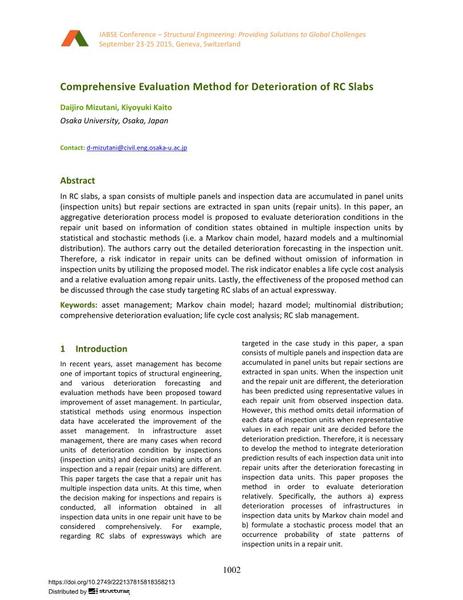Comprehensive Evaluation Method for Deterioration of RC Slabs

|
|
|||||||||||
Détails bibliographiques
| Auteur(s): |
Daijiro Mizutani
(Osaka University, Osaka, Japan)
Kiyoyuki Kaito (Osaka University, Osaka, Japan) |
||||
|---|---|---|---|---|---|
| Médium: | papier de conférence | ||||
| Langue(s): | anglais | ||||
| Conférence: | IABSE Conference: Structural Engineering: Providing Solutions to Global Challenges, Geneva, Switzerland, September 2015 | ||||
| Publié dans: | IABSE Conference Geneva 2015 | ||||
|
|||||
| Page(s): | 1002-1009 | ||||
| Nombre total de pages (du PDF): | 8 | ||||
| Année: | 2015 | ||||
| DOI: | 10.2749/222137815818358213 | ||||
| Abstrait: |
In RC slabs, a span consists of multiple panels and inspection data are accumulated in panel units (inspection units) but repair sections are extracted in span units (repair units). In this paper, an aggregative deterioration process model is proposed to evaluate deterioration conditions in the repair unit based on information of condition states obtained in multiple inspection units by statistical and stochastic methods (i.e. a Markov chain model, hazard models and a multinomial distribution). The authors carry out the detailed deterioration forecasting in the inspection unit. Therefore, a risk indicator in repair units can be defined without omission of information in inspection units by utilizing the proposed model. The risk indicator enables a life cycle cost analysis and a relative evaluation among repair units. Lastly, the effectiveness of the proposed method can be discussed through the case study targeting RC slabs of an actual expressway. |
||||
